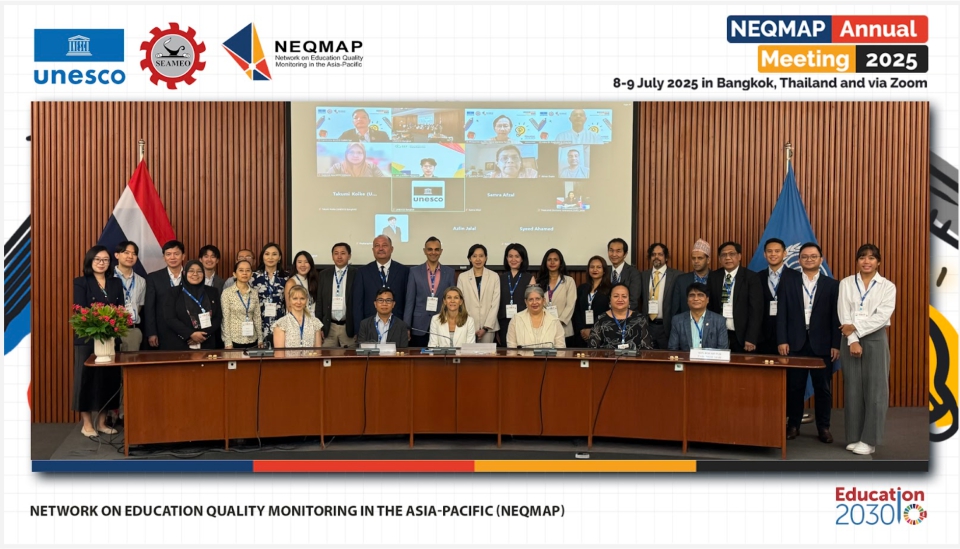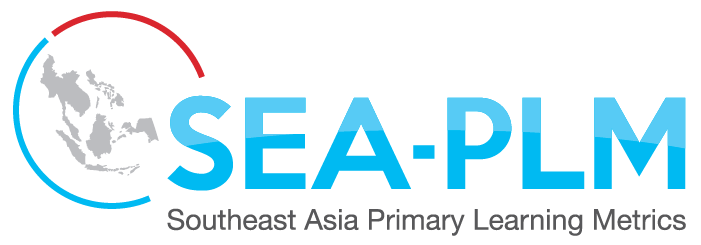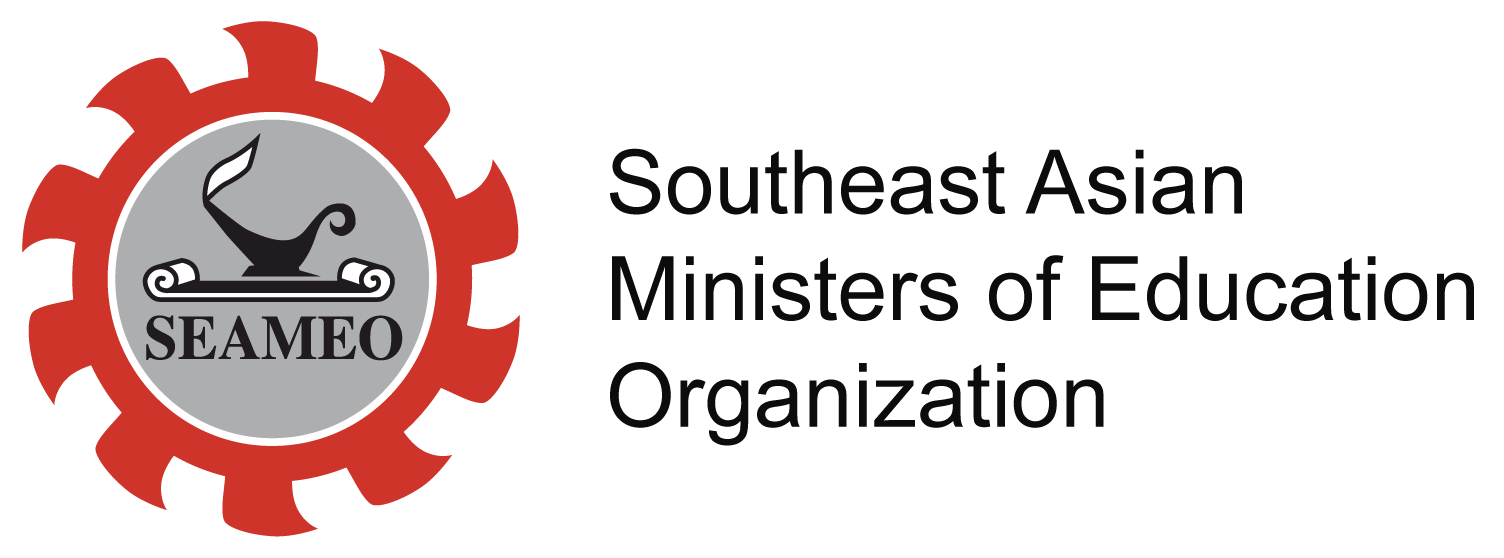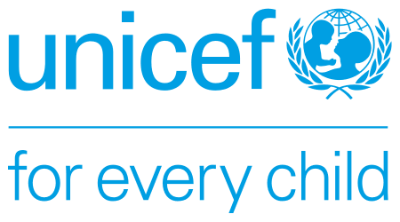At the NEQMAP 2025 Annual Meeting, three countries shared how SEA-PLM data is shaping policies and closing learning gaps.
On 8–9 July 2025, the Network on Education Quality Monitoring in the Asia-Pacific (NEQMAP) held its Annual Meeting in Bangkok, with support from UNESCO Regional Office in Bangkok and Office for UN Coordination for Asia and the Pacific (UNESCO Bangkok) and the SEAMEO Secretariat. A dedicated session, organized by the Southeast Asia Primary Learning Metrics (SEA-PLM) Regional Secretariat, outlined how Cambodia, Malaysia, and Viet Nam are using SEA-PLM data and evidence to strengthen foundational learning.
Before the country spotlight, Mr. Alejandro Ibanez, SEA-PLM Programme Manager, emphasized that SEA-PLM drives two core initiatives: the cyclical SEA-PLM surveys, which provide data to monitor student foundational learning, and evidence-to-policy linkages, which aim to translate assessment results into actionable education reforms. As Mr. Ibanez noted, “The objective of SEA-PLM is to provide countries in Southeast Asia with reliable data to create meaningful educational policies and interventions.”
Building on this regional overview, the three representatives showcased how their countries are applying SEA-PLM evidence to strengthen curriculum, teacher training, and policy reforms in basic education. With the recent completion of the 2024 Main Survey, countries now have a critical opportunity to accelerate data-driven strategies to improve learning outcomes. It also helps advance reporting on the region’s performance under SDG 4.1.1b (Minimum proficiency in reading and mathematics at the end of primary school).

From left to right: Dr. Maszuraini Binti Miswan (Malaysia); Ms. Linda Jonsson (UNICEF EAPRO); Mr. Alejandro Ibanez (SEA-PLM Secretariat); and Dr. Khanh Pham Quoc (Viet Nam). Joining via Zoom: Mr. Sarin Sar (Cambodia).
In Cambodia, Mr. Sarin Sar, Deputy Director, Education Quality Inspection Department, Ministry of Education, Youth and Sport (MoEYS), highlighted its Early Grade Learning programme, Komar Rien Komar Cheh, focused on Khmer and Mathematics, which significantly improved learners’ competencies through targeted teacher training and enhanced learning resources. “SEA-PLM findings have been instrumental in shaping our 10-point policy response, directly impacting our students’ foundational learning outcomes,” said Mr. Sarin.
From Malaysia, Dr. Maszuraini Binti Miswan, Principal Assistant Director at the Ministry of Education’s Research and Planning Division, presented the country’s curriculum mapping initiative, which aligned SEA-PLM assessment items with the national curriculum (Kurikulum Standard Sekolah Rendah, KSSR) and teaching strategy (Dokumen Standard Kurikulum dan Pentaksiran, DSKP). This alignment highlighted the need to strengthen Higher Order Thinking Skills (HOTS) in classrooms. Malaysia plans to address these in their upcoming 2027 curriculum revision and the development of their new education blueprint.
Meanwhile in Viet Nam, Dr. Khanh Pham Quoc, Deputy Director General of the Education Quality Management Agency, shared a major capacity-building programme guided by Ministerial Decision No. 468 (2023 Ministry of Education and Training decision approving a national general education assessment system for 2022–2030), which involved extensive training of educational managers and primary teachers across 63 provinces, resulting in an assessment item bank aligned with the SEA-PLM literacy and numeracy framework.
Together, the experiences of Cambodia, Malaysia, and Viet Nam demonstrate how SEA-PLM evidence is already shaping reforms at the national level. Building on these lessons, the discussion concluded with insightful exchanges on how large-scale assessments can drive smarter policies and stronger systems. It underscored the region’s shared commitment to advancing foundational learning by turning evidence into lasting change, ensuring that every child can learn and thrive.
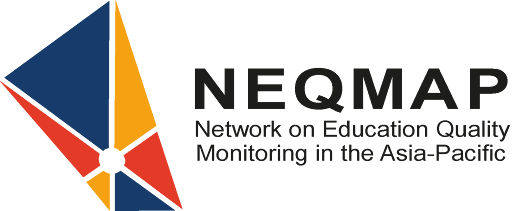
The Network on Education Quality Monitoring in the Asia-Pacific (NEQMAP), established in 2013, is a regional platform for sharing knowledge and expertise on education quality. It focuses on student learning assessment as a key tool for monitoring progress, while also recognising the vital links with curriculum and pedagogy. NEQMAP is coordinated by UNESCO Bangkok.
Related Links
- 2025 NEQMAP Annual Meeting: https://neqmap.bangkok.unesco.org/2025-neqmap-annual-meeting8-9-july-unesco-bangkok/
- SEA-PLM Programme: https://www.seaplm.org/
- SEAMEO Secretariat: https://www.seameo.org
- NEQMAP Knowledge Portal: https://neqmap.bangkok.unesco.org/
- SDG4-Education 2030 Asia-Pacific Hub: https://unes.co/learningandeducation2030
- UNESCO Bangkok: https://www.unesco.org/en/fieldoffice/bangkok
- UIS Learning Assessments: https://uis.unesco.org/en/uis-learning-outcomes

